Peter MALONE
Saturday, 18 September 2021 19:26
Chained to Yesterday/ Limbo
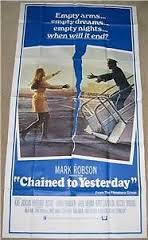
CHAINED TO YESTERDAY (LIMBO)
US, 1972, 110 minutes, Colour.
Kate Jackson, Kathy Nolan, Katherine Justice.
Directed by Mark Robson.
Chained to Yesterday was formerly titled Limbo and Wives or Widows. It is obviously aimed at a women's audience and shows the reaction of three wives of Vietnam P.O.W.'s: the young wife attracted to another man, the mother of a family who tries to keep going, the rich wife who won't accept the news of her husband's death. In its way, it is well made and acted and has some interest because of its theme (and released just before the 1972 cease-fire). It raises questions in an easy way, asking for an emotional response from its audience.
1. The film has had three titles: Chained to Yesterday, Limbo and Wives or Widows. which seems best? Why?
2. Was this just sentimental soap opera or did it have more value than this? What?
3. The film is set in 1971. The cease-fire came at the end of 1972. How would the film have made its impact before the war was over? How does the ending of the war change the perspectives?
4. Comment on the impact and atmosphere of the war sequences during the credits.
5. Did you identify with Sandy? Why?
6. How well did Sandy love Roy? Was enough background of their marriage given? what impact did the news of his disappearance make? How well did Sandy cope? what kind of a girl was she? How strong?
7. Was the Air Force sympathetic enough and just towards her?
8. Did you like Mary Kay? Why did she help Sandy? Was this best for Sandy and for Mary Kay?
9. Comment on the impact of the wives watching film to identify their husbands? How sorry did the film want us to be for these wives? How did it make the audience feel sorry?
10. What was the significance of the Paris visit? The interview with the North Vietnamese? The letter? The film of the bombing victims? Comment on the effect on the three wives.
11. What was the significance of the Washington visit? Sharon's speech? Mary Kay's outburst and its being ignored? The Congressman and the day of prayer?
12. Why did people such as Sharon have such faith in the U.S., the President and the government and the need for victory?
13. Why were people like Mary Kay disillusioned with the outcome of the war and U.S. involvement? (The clash interrupting the lecture).
14. Why did Sandy fall in love with Alan? Was it fair of him to pursue her? (What message was being conveyed in his anti-war speech about his career?) Did Sandy handle the situation well? What could she or should she have done?
15. How did this compare with Phil's pursuit of Mary Kay? was this fair of Phil? How did Mary Kay handle the situation? What should she have done?
16. Did these episodes show the loneliness and needs of the wives or widows?
17. Why did Joe hate his mother? Was this convincing?
18. What kind of person was Sharon - wealth, society, connections, politics? why would she not accept her husband's death?
19. What was the impact of the arrival of Roy’s letter - on Sandy, on Alan, or Mary Kay? Why did Sandy go back to Alan?
20. What was the impact of the First Communion sequence? why was it included? For such length?
21. What was the impact of the news of Brian's death - in view of Mary Kay's confession to Phil, the First Communion?
22. Was the reconciliation of Joe with his mother convincing?
23. What was the impact of the ending - on each of the characters present, on the audience? what future did Sandy and Roy have?
24. How valuable are films like this? Why?
Published in Movie Reviews
Published in
Movie Reviews
Tagged under
Saturday, 18 September 2021 19:26
Chained Heat

CHAINED HEAT
US, 1983, 93 minutes, Colour.
Linda Blair, John Vernon, Sybil Danning, Tamara Dobson, Stella Stevens, Henry Silva.
Directed by Paul Nicholas.
Chained Heat is an ugly exploitation prison film. Underlying it, there are many valid criticisms of prisons, systems, the oppression of women in prison and their exploitation, the double values of administration and guards. These issues do emerge. However, the texture of the film is sex and violence of a very exploitive kind. This is highlights by the film's focusing on its heroine, Linda Blair being persecuted yet again, who is imprisoned for manslaughter and mixed in with some of the worst women prisoners seen on screen. These include Sybil Danning as a sex-crazed leader and Tamara Dobson (Cleopatra Jones) who leads the black group in the prison. They are involved in drug dealing. Stella Stevens is a sadistic guard, emotionally involved with the sinister Henry Silva and also involved in drug-dealing. John Vernon, in one of the worst-written performances in his career, is a corrupt prison governor involved in drug-dealing and self-pornography. (This latter enables a lot of attractive starlets to be prisoners.)
There is a lot of violence in the cells and outside the cells, riots, rapes and bashings, suicides. There is also an attempt at escape.
An example of exploitation material popular in the '80s which attempts to have some repute by its cast and its seeming attempt to consider social issues.
Published in Movie Reviews
Published in
Movie Reviews
Tagged under
Saturday, 18 September 2021 19:26
Canary, The
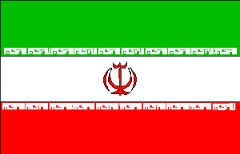
THE CANARY
Iran, 2004, 88 minutes, Colour.
Directed by Javad Ardakani Movaqati.
The Canary was filmed in Lebanon standing in for Palestine. The film is a strong plea for understanding and tolerance of the situation of the Palestinians, the brutality of their treatment by the Israelis.
In a town in the occupied West Bank area, a family try to live out their ordinary life. The father is in the Resistance and is taken away by the police. His house is bombed. The focus of the film, however, is on the younger son, a small boy who stammers. He is friendly with the local priest who gives him his canary as a gift, for him to look after, for him to learn some kind of responsibility in caring for the bird. The boy loves the bird and takes it everywhere, causing clashes in the household with the noisy television disturbing the canary and preventing it from singing, putting it in the clothes cupboard of his older brother, eventually having the bird in its own bird house, built by the priest. There is also a clash with two boys from the Catholic school who eventually take the canary but give it back and build the new bird house after the exploding of the home. The older brother is training to be one of the stone throwers against the Israelis. The grandparents also live with the mother and her boys.
The film shows the confined life of the Palestinians, in their area, at home, not allowed out. It also shows the continued noise of shootings, planes going overhead, the continual disruptions to ordinary life which is portrayed in the workplace and at school.
The film is a sympathetic presentation of relationships between Muslims and Catholics. The Israelis are seen as the enemy and a great deal of footage of uprisings and their being put down are screened on the television.
The film is a plea for the plight of the Palestinians, symbolised by the young boy, his care for the canary which could symbolise the land which was under threat and needs final freedom. The film also shows quite clearly how innocent young minds, living in this situation, under attack, can grow into stone throwers and Resistance members, even to suicide bombers.
1. The impact of the film? About Palestine, about the Israelis? The portrait of a family, the portrait of a boy and his canary?
2. Lebanon standing in for Palestine? The town, the streets and the houses, the beach, the bamboo reeds? An atmosphere of Palestine?
3. The Intifada situation, the Israelis and the tanks, the soldiers, the shootings, the bombings? The exploding of the houses of Resistance members? The statistics given in the number of children dead? The footage showing on the television?
4. The family, the father and his resistance, his being taken, the house exploded, the mother and brother taken? The brother and his sling, the stone-throwing against the Israelis? Fares and the sling being his father's memorial, his taking it, training with it, the potential to be a Resistance fighter when he grows up?
5. Fares, his stammer, his friendship with Father Simon, in the church, given the canary? His care of the canary, taking it with him everywhere? In the house, trying to keep the silence, throwing the stone at the television? Clearing out the cupboard? His getting the house, Father Simon's care, his mother's complaints? The bamboo house, taking the canary to the beach, getting the bamboo, the boys chasing him, taking the canary, his tracking it down, their returning it, his hostility towards them, Father Simon getting them to build the new bird room, the reconciliation? His love for the canary, tender care for it, wondering whether it had died, Father Simon and his help? Taking the canary with him, running through the soldiers' cordon, saving it? The details of his daily life, at home, with the family, at school? His finally being shot, taking the bird, letting it go free? With his father's memorial, the statue of Mary strafed in the church, his father's photo?
6. Father Simon, his friendship, the boys, the choir, the life in the church, his friendship with the Muslim families, the gift of the canary? The mother going to complain and his helping? The new house, making the boys build the second room? The church being attacked, the statues being strafed, his being injured?
7. The Resistance, the father, his disappearance, coming back to the church, Father Simon helping the boy see his father? Khaled, his daughter, the safe house - and then it being exploded?
8. The people in the town, the boys, the choir, Khaled and his family, the schoolteachers and the way of life at the school?
9. The Palestinians, their being oppressed, an oppressed mentality, on the defensive, on the attack? Fares and his not knowing the realities of the Palestinian situation, the Resistance? His house under threat, his father disappearing, his bird and his defence of it? His taking the sling, practising how to throw the stones, the making of a Resistance fighter?
10. The film showing a very serious situation through focusing on a child?
Published in Movie Reviews
Published in
Movie Reviews
Tagged under
Saturday, 18 September 2021 19:26
Country Girl, The
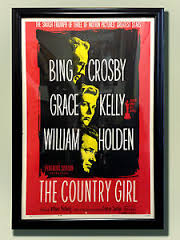
THE COUNTRY GIRL
US, 1954, 105 minutes, Black and white.
Bing Crosby, William Holden, Grace Kelly.
Directed by George Seaton.
The Country Girl was one of the most popular films of 1954. Grace Kelly was almost at the height of her popularity - (she had just made Dial M for Murder and Rear Window for Hitchcock; To Catch a Thief and The Swan were still to come) - she won the Oscar for this performance. William Holden was a very popular leading man and had won the Oscar for Stalag 17 the year before, Bing Crosby was still well-known and popular. The three stars acted well in this film and made an impression.
The film is based on a play by Clifford Odets, adapted for the personality and musical style of Bing Crosby. It was written for the screen by George Seaton who has written and directed many 'respectable' dramas like The Counterfeit Traitor, Thirty- Six Hours and Airport.
The theme of appearances and reality is strongly to the fore in this film and is explored tellingly. At times some of the sequences are so moving that they are exasperating - the characters misunderstand one another and inflict pain. The relationship in a difficult marriage is presented well and asks for discussion.
1. What was the overall emotional impact of this film on you? Why? Was the film a worthwhile emotional experience?
2. How wise was this film? Its insight into men and women? Into problems?
3. What insights did the film offer on the nature of love? Loyalty? Fidelity? Self-sacrifice in marriage?
4. First impressions of Frank Elgin? Was he an attractive character? Did you hope he would get the job? Did you feel that people were fair to him? Did you share Frank's point of view on Georgie? Why was he so weak in himself? Were you shocked to find that he was weak and that he told lies about his wife? What made him an alcoholic? Did his son's death have a great effect on him? Or was it an excuse for the weakness that was already there? Why did he prove so difficult during rehearsals? Why was he always wanting to save himself from being hurt? Why did he try to appear friendly and nice to everyone and then deny it in front of his wife? where was the big crisis for him in the film? Why did he go to pieces and get arrested for drunkenness? What was it that eventually made him succeed? Did he have a successful future ahead of him by the end of the film? Why?
5. What were your first impressions of Georgie? Did you have the same point of view as Barney? Did she seem too hard and feelingless? When did you begin to change your attitude? How real a person was she? How noble? (The effect of the flashback with her son during the recording?). Why did she put up with Frank? Why did she love him? Why did she continue to support him? Could you understand how desperate she felt at times? Did you wish that Barney understood her? Why? What was the impact of the sequence where Barney found out the truth? What effect did this have on her? How was she transformed by Frank's success? Why was she attracted to Barney? Could she have left frank? Why didn't she? Did Grace Kelly's performance give insight into the character of Georgie?
6. What kind of person was Barney Dodds? Was he a brittle successful man? Living for his work? Why did he place such faith in Frank? Has this a good attribute of his character? Why was he so ready to dislike Georgie? Its relationship to his own unsuccessful marriage? His attitude in pushing and supporting Frank? His ruthlessness towards Georgie? His blindness? Why did he so believe in Frank? The impact of the truth on him? His relationship then to Georgie? Did he have the right to take her from Frank? Was his response to Georgie's choice honest?
7. What did the film have to show on lies and personal misunderstandings? How forcefully?
8. Was Frank's transformation possible? Georgie's? Were the proper choices offered at the end? About successful career and about marriage?
9. Did the musical background add or detract from the film? The musical play? Bing Crosby's personality and reputation? The music in the bar? The memory of the record? How effective was this?
10. Was this a real drama about real men and women and choices?
Published in Movie Reviews
Published in
Movie Reviews
Tagged under
Saturday, 18 September 2021 19:26
Catch That Kid
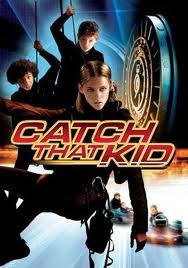
CATCH THAT KID
US, 2004, 91 minutes, Colour.
Kristen Stewart, Corbin Bleu, Max Thieriot, Jennifer Beals, Sam Robards, John Carroll, James le Gros.
Directed by Bart Freundlich.
I don't want to seem puritanical, but... The IMDb website indicates that the tagline for the film is "They're on a mission without permission" and that the plot summary says that it is an Ocean's 11 or Mission Impossible for kids.
When Dad, who runs a go-kart derby ground, has an accident that will mean he will not be able to mountain climb anymore, his tomboy daughter and friends decide to rob the bank where her mother is the security adviser. So we watch the unlikely gang outwit everyone to get away with $250,000. But it's a good cause, so it's OK!! Well, not quite, there is a moral tacked on at the end but it looks like a manifestation of the 'greed is good' philosophy rather ruthlessly applied by the children. Kristen Stewart (Jodie Foster's daughter in Panic Room) is the ringleader, Jennifer Beals her mother.
The US MPAAA rates it PG but is concerned about 'language' and 'rude humour'. It also mentions 'thematic elements' but does not elaborate.
I know it's supposed to be good fun, but...
1. Children's film? Family film? The title, the alternate title, Mission Without Permission?
2. The locations, the town, the bank, homes, school, the go-kart area? The streets? Used for the plot, for the chase, for special effects? The musical score?
3. The situation: Maddy, the tomboy, her friends Austin and Gus, the strained relationship with her mother who was always busy, her love for her father and his work at the go-kart club, his action and mountain climbing? The go-kart races, her supervising, her tomboy activity and her parents forbidding her? Her father's accident, the prospect of not being able to climb mountains? Her wanting to do something, the hospital's advice about the cost for an operation in Denmark?
4. The plan, with Austin and Gus, their devotion to her? Their scouting out the bank, learning the security measures? The old owner of the bank? Mr Hartman? The plan, the devices, the use of the go-karts, the use of their own machines to get the money? The clash with the security officer, the boy who was his assistant?
5. The robbery itself, the timing, the luck, the plans, the security guard, the boy and his collaboration? The dangers, their getting stuck? Eventually getting free, through the party, through the streets?
6. The character of Maddy? Her relationship with Austin and Gus, their both thinking she was in love with them? Their participation in the plan? Their different characters, action and thought? The finale with her wanting to choose one or the other?
7. Molly, her work at the bank, security, the rich old man and his not approving the security, the tests? The social, the borrowing of the money, the future of the bank? The alarm, the robbery? The consequences for Molly? Her saving the day by saying that the children's behaviour was all a security test? Tom, loving his daughter, in hospital, the need for the money to go to Denmark, the result of the robbery, the irony of the children getting the reward? Mr Hartman and his genial advice? Tom recovering?
8. Feral, the comedy with the inept security guard, slapstick, Brad and his helping him?
9. The adults, the adult world, the bank, socials, security, the police? Contrasting with the world of children - innocence yet knowing how to rob a bank, even if for a good cause?
Published in Movie Reviews
Published in
Movie Reviews
Tagged under
Saturday, 18 September 2021 19:26
Chasing Liberty

CHASING LIBERTY
US, 2004, 105 minutes, Colour.
Mandy Moore, Jeremy Piven, Anabella Sciorra, Matthew Goode, Mark Harmon, Caroline Goodall.
Directed by Andy Cadiff.
In the US Mandy Moore is a popular singer. She has been branching out into acting in recent years and has been presenting a wholesome image in such films as the clean-cut A Walk to Remember. Her agent must have suggested that she try to be a little more bold. So, here is Chasing Liberty.
The screenwriters seem to have had more than half an eye on Chelsea Clinton's history, especially her studying in Oxford and experiencing her own freedom. Here, the president's daughter (Moore) spends most of the film avoiding the secret service (in the form of Annabella Sciorra and Jeremy Piven) and getting a taste of liberty. Fortunately for us, she does not get confined to the White House and Washington (where he poor beau is overwhelmed by autograph and photo opportunity hunters and squads of secret service agents). The President (Mark Harmon of all people) has to go to Prague, so we have postcards (visualised on the screen) of Prague, then of Venice, of Austria, of London, all very attractive. And there is that old chestnut of a plot: the man who rescues her (Matthew Goode, British, of course) who is, in fact, an agent who has to keep her out of trouble (he fails, singularly) and who disillusions her when she finds out the truth.
Plenty of froth and bubble and secret service agents.
1. A star vehicle for singer Mandy Moore? Her screen persona?
2. The settings: Washington and the White House and the restaurants, Prague and the scenic aspects, Venice and the lagoons and hotels, the road in Austria, Vienna, London? The literal putting of postcards on the screen? The musical score?
3. The plausibility of the plot, the career of Chelsea Clinton at Oxford? The president's daughter, feeling confined, the Secret Service, chasing liberty?
4. Anna and her personality, her age, experience, being in the White House, used to the public eye, her father having been governor? Her relationship with her strict father, with her mother? Her going out, the entourage, the young man taking her out, security at the White House gate, at the restaurant, the photo seekers, the boy being edged out? Incidents? The Secret Service and their swarming? Anna's exasperation, wanting to be free?
5. The president, his strictness, his foreign policy? Policy towards his daughter? Relationship with his wife? Trying to find out how to handle a teenager? His public office, public appearances, Prague? In contact with the Secret Service? Getting Ben to look after Anna? Phoning in? Continued surveillance?
6. Anna, her ways of getting out of her father's clutches? Going on the town, meeting people, her behaviour, her wanting to feel free? Her getting into scraps? The Secret Service always appearing? Ben, his being able to save her? Her attraction towards him? The revelation that he was also part of the Secret Service? His getting the mission to accompany Anna, report in, keep her out of trouble? Their travelling, the trains, going in the wrong directions, in Venice, as husband and wife, on the gondola, the free ride, newlyweds? Going to the house, the old lady and her kindness? Their clash, her wondering about the marriage? The continued journeys, in Austria, the festival? The people on the road, Anna and her discovery of the truth, trying to give Ben the slip? Her having to go back to the United States? The experience of freedom? Her going to England, meeting Ben - a cheery future?
7. Alan and Cynthia, on Secret Service duty, their clashes with each other, their falling in love, ever present with Anna, the romance?
8. Ben, his British background, work in the Secret Service, charming to Anna, riding the bike, saving her from difficulties, the truth, his always being with her, finding ways to call in to the president? His being dismissed? Back in England?
9. The people in Prague, with Anna, the family in Venice? The farmers on the road? Her chance to meet ordinary people - and ordinary people being nice for Anna?
10. Piece of romantic fluff - but grounded in the realities of the children of celebrities and the need for security and protection?
Published in Movie Reviews
Published in
Movie Reviews
Tagged under
Saturday, 18 September 2021 19:26
Crimson Tide
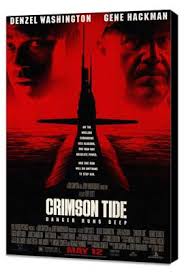
CRIMSON TIDE
US, 1995, 116 minutes, Colour.
Denzel Washington, Gene Hackman, George Dzundza, Vigo Mortensen, James Gandolfini, Matt Craven.
Directed by Tony Scott.
Crimson Tide was produced by Jerry Bruckheimer and Don Simpson, responsible for such hits as Top Gun. This time they focus their attention on submarines and the aftermath of the Cold War, nuclear dangers still remaining. The director is Tony Scott, also director of Top Gun (as well as The Hunger, Days of Thunder, The Last Boy Scout, True Romance).
The film had many screenwriters including Quentin Tarantino (and some hip discussions about current issues and submarine movies). There were also contributions by Robert Towne (Chinatown) and Steven Zaillian (The Search for Bobby Fischer, Schindler's List).
The film, while talking about the traditions of submarine movies like Run Silent Run Deep, The Bedford Incident, is a showpiece for Denzel Washington and a confrontation with Gene Hackman as the captain of the ship. The film raises issues of the '90s, rogue Russian nationalists, nuclear dangers, the American response. It also raises issues of letter of the law command in the military forces as well as more personalised interpretations.
1. An action film of the '90s? The US and Russia? Tensions after the Cold War? Nuclear tensions?
2. The world of the submarine? The interiors, a sense of enclosed space and isolation? The dangers in enclosed space under the sea surface, the danger of falling to depths, flooding...? The colour codes for the various locations within the submarine? The contrast with the ending on land? The tension in submarine dramas, in warfare, strategies and tactics, personality clashes? The musical score and its atmosphere?
3. The title and its tone? The contribution of the stars?
4. Russian politics in the '90s, the Ultra Nationalists and their dangers? Nuclear risks? The USS Alabama and its role in defending the US? Alert to Russia? The stances of the personnel in the submarine? The internal submarine politics - right-wing and left-wing, harsh stances and personalised interpretations?
5. The messages coming through, the pre-emptive strike, the torpedoes? The melodrama of the incomplete message? Creating the situation for interpretation? Hawks and doves?
6. Gene Hackman as Ramsay, personality, the letter of the law, against intuition? His hawkish stances? His severity with Hunter and the other members of the crew? COB and his opinion? The factions in the submarine and their clashes? Ramsay as a rallying point for the hawks? His background in military service, Washington and their reliance on him?
7. The contrast with Denzel Washington's Hunter? The Harvard background, dove attitudes? The support of the book and the letter of the law, COB? The interpretation, his opinions with Ramsay, the clash, his taking command?
8. The issues of hawks and doves, the letter and the spirit of the law, the following of orders, risks and interpretation of orders?
9. Hunter and his skills, saving the submarine from the torpedoes, the melodrama of their sinking, the flooding, the deaths? Radio damage? The weapons officer and friendships and loyalties? The factions, their military tactics and alliances, stealth and subterfuge? Freeing Ramsay, imprisoning Hunter?
10. Ramsay and the launch? Hunter and his escape? The orders on the intercom? The battle and the stand-off? The message coming through - and the support of the interpretation of law rather than the letter of the law?
11. The personnel on the submarine, COB and his support despite personal loyalties? The weapons officer? The factions, the leaders and their motives?
12. The court martial, Ramsay and the analysis of his behaviour, his motivation? His future? The two men walking and his support of Hunter?
13. Themes of power, authority? Theories of war?
Published in Movie Reviews
Published in
Movie Reviews
Tagged under
Saturday, 18 September 2021 19:26
Criss Cross
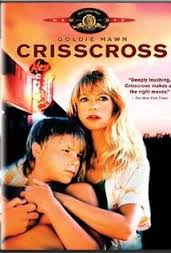
CRISS CROSS
US, 1992, 100 minutes, Colour.
Goldie Hawn, Arliss Howard, James Gammon, Keith Carradine, Steve Buscemi.
Directed by Chris Menges.
Criss Cross was produced by Goldie Hawn. While she has the starring role, David Arnott, 12-year-old actor, as her son has the central role and focuses the film.
The setting is 1969 in Florida, the moon landing is about to happen. This is the setting for a memoir about American families, divorce and break-up, the effects of the Vietnam War, the difficulty of a single parent earning enough money for her son and supervising him. He does jobs around the town and becomes involved in drug dealing. There are undercover agents trying to break up drug rings.
While the film is serious, it has a lighter tone. David Arnott has voice-over commentary on his experiences as a boy of 12, his relationship with his mother, fighting with her, her jobs and deciding to do stripping in a local club. He yearns for his father, a former ace pilot who has been affected by the war, taken a vow of silence, separated from the family and lives in a monastery in Miami. This part is played by Keith Carradine.
The material is that of a telemovie - but it is quite interesting material for people looking at family life and relationships. It was directed by the British cinematographer (The Mission) Chris Menges, who also directed the interesting South African drama, A World Apart.
1. The O.C.I.C. American family, difficult times, coping and not coping in the '60s - and the aftermath from the perspective of the '90s?
2. The re-creation of the '60s, Florida, the background of the Vietnam War, working in diners, strip clubs? Drug dealing and boats?
3. The atmosphere and its authenticity, the musical score and the use of songs of the period?
4. The background of the moon landing, an image of American enterprise - at the time when the war and family break-up were damaging the American people?
5. The title, the life of the family, Chris's name?
6. Chris at the centre of the film, the talent of the actor, holding the film together, his voice-over commentary on his experience? Age, bike-riding, on the job? The story of his father, Vietnam, the return, his drinking, silence, leaving? Missing his father, hopes for a reunion? His decision to visit him in the monastery, the awkwardness, sharing discussion, working in the garden with him? His clashes with his mother? The accommodation, poor? Not liking school? The various jobs, his girlfriend and liking her, the outings with her, sexual experimentation? The group of friends - and his being the boss? Playing together, clashing? The various jobs, the boat and the fishermen? The arrival of Joe, his wariness, becoming more friendly? Overhearing the strippers and going to see his mother at work, his disappointment? Her telling him the truth and his clashing? Discovering the drugs, deciding to deal? His making money and offering it to his mother? The final set-up, Joe going on the boat, the dangers and the agents, the dealers and their arrest? Going to the police with his mother, his commentary on what he had done, probation? The wise friends about the diner and his talking things over with them? Learning, his reflection on this period of his life? His future?
7. Tracey, Goldie Hawn's screen style and presence? The experience of marriage, her husband in Vietnam, silence, drinking, leaving? The divorce? Forever tired, hard work, at the diner, her decision to strip and her embarrassment, explaining it to her son? Snapping at him and fighting? Joe's arrival, the attraction, the relationship? Her going to get Chris from the monastery, confronting her husband? Not knowing that Chris was drug-dealing, her anxiety, her antagonism towards Joe at the end? The future with her son?
8. The brief portrait of Chris's father, the story told verbally, going to Miami and remembering him as a pilot? Seeing him in the monastery, the visit, his work, sharing his work, talking things over, warmth and affection, his mother coming to take him away?
9. The drug dealers and their use, being stoned, running the restaurant? The contact with the drugs on the ship?
10. Chris and his friends at the diner, the chats, advice?
11. Joe, mysterious past, relationship with Tracey? Friendship with Chris and Chris warming to him? Going on the boat, the agents and the bust?
12. A portrait of different times, difficult times, parents and relationships? The war, the moon walk, memories of the '60s?
Published in Movie Reviews
Published in
Movie Reviews
Tagged under
Saturday, 18 September 2021 19:26
Crimes and Misdemeanours
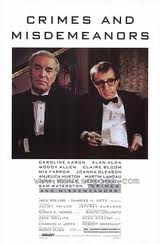
CRIMES AND MISDEMEANOURS
US, 1989, 107 minutes, Colour.
Martin Landau, Woody Allen, Anjelica Huston, Mia Farrow, Claire Bloom, Sam Waterston, Caroline Aaron, Alan Alda, Joanna Gleason.
Directed by Woody Allen.
Crimes and Misdemeanours was acclaimed as one of Woody Allen's best films. It has two plots. The comic plot, focusing on Allen himself and Alan Alda and Mia Farrow, is superb: a satirical look at a documentary film-maker in New York, a successful Hollywood TV producer, relationships and frustrations. It is perfectly written with wit and insight. The second plot is more serious: a focus on Martin Landau as a successful ophthalmologist who has betrayed his wife in an affair, is in a dilemma with the clinging mistress and eventually succumbs to having her murdered. He has to face his guilt. The main focus in this story is Landau, Claire Bloom as his wife, Jerry Orbach as his brother. Between the two stories is a saintly Jewish rabbi who is losing his sight. He is a patient of Landau, he is a brother to Alda. He is played by Sam Waterston - almost too, too good to be true.
In this story, the dialogue is often rhetorical, exploring the meaning of responsibility, guilt, God and moral and ethical questions. There is another motif throughout the film - the Allen character is doing a documentary on a Jewish philosopher. On video film, this philosopher explores the meaning of religion, life, love in the Jewish tradition. However, he eventually suicides.
Thus the film is a blend of the comic and the serious. The title is derived from Dostoevsky and, of course, implies questions of crime and punishment. The irony is that the punishment does not come - and much has been written as to whether Allen is offering any solution to questions of God and morals or is merely being detached, even cynical. The film, like Hannah and Her Sisters, goes back to Jewish traditions (more explicitly than in any other Allen film) and to family bonds.
The cast is generally excellent. Landau stands out in the serious section - although Anjelica Houston's mistress is somewhat strident and melodramatic. The acting in the Allen section is particularly good, Alan Alda never better, Mia Farrow most sympathetic as a television producer.
All the Allen ingredients are there - a film to be seen again and discussed.
1. Woody Allen's contribution of writing, directing and acting? The place of this film in his canon of movies? His skills, insights, wit?
2. The New York settings, the sweep of the city? The focus on Jewish groups and individuals, intellectuals, people involved in culture and professions, the media? New York Jewish religion? The landscapes, interiors? Reality and unreality? The musical score and the use of songs? The use of movies to make comment on the action?
3. The structure: Judah's story, Cliff's story, the two different worlds, the parallels in relationships and handling of them, Ben as the bond?
4. The title and the reference to Dostoevsky? Serio-comic? The variations? Allen's skill in comic writing, his skill in serious writing, rhetoric and drama?
5. The world view of the film: the background of the Jewish religion, the image of the Jewish scripture God, his eyes on the world, the response of Jews to the eyes of God and to God's justice? Questions of justice and truth? Judah's father and his preference for God over truth? Ben as the rabbi, his sincerity, the action of grace, the moral foundation for life and behaviour? The professor and his discussions of religion, responsibility, decisions and love? The irony of his suicide? Themes of order and the transcendent? The banality of evil? How cynical Allen's perspective on crime, punishment, guilt? The resolution in ordinary values, conscience, family? The focus on the blind Ben dancing happily with his daughter at her wedding?
6. Judah and the introduction to him: the dinner and the tribute, his loving wife and family, his status, his hard work? His work with eyes, memory about the eyes of God, helping people to see, unable to stop Ben going blind? The letter from Dolores, the flashbacks and his memory of the affair? The reasons for it? Del and her passion? The meetings, his wanting to break, his having led her on, questioning his motives, trying to cope? Her phone calls? His birthday and her passionate call, the family supporting him? His lies, her clinging to him, the gifts? Emotional blackmail? The reason for the appeal to his brother, talking to him, his horrified reaction about the contract and her death? The temptation, his calling his brother, making the decision on the phone? The effect of the news of her death, aghast, going to see her, no sight in her eyes? Taking incriminating documents? His collapse? His talking to Ben in his surgery, ethical questions, the Jewish tradition? Sitting in the night, unable to sleep, and imagining Ben, the argument about killing Dolores? Remembering his family, the flashbacks and his looking at his free-thinking aunt, listening to his father, the discussions? Their reaction to him and his behaviour? With Jack, nervousness about the crime? His outbursts to his wife? Finally talking to Ben, being quiet, the discussion with Cliff? Resignation, memory fading, the banality of evil? Rejoining his family, forgetting, living with his crime, any forgiveness? The portrait of Miriam? Her support and love? Place in society? His children?
7. Dolores and her passion, her needs, the letter, wanting to talk to Miriam, the meetings, her apartment, the desperate phone calls, the service station? Gifts? Her desperation, the murderer arriving, the pathos of seeing her dead? (How much did the audience share Judah's relief that she had died?)
8. Miriam and the family, her perfection, society, support, concern?
9. Jack, the black sheep of the family, his place in the family, rejecting the tradition? His talk with his brother, discussions about the contract, the criminals, doing favours? The phone call after the job? His concern about Judah and his confessing to the police, threatening him? Living by the criminal code?
10. Ben as the link between the two stories? The eyes of God, his deteriorating eyes, his going blind? Yet his vision for life? The good man, the sympathetic listener, kind? The contrast with Lester? His wife and family, love for his daughter? Meeting Cliff and the rest of the family, at socials? His appearing to Judah and his wise advice? The rabbi, the tradition? His blindness, his behaviour at the wedding, the dance with his daughter? A solution for life?
11 Woody Allen as Cliff? Humour, one-liners, the proneness to depression, the variation on the Allen characters from other films? His work, making movies about leukemia, the festivals and prizes? His marrying his wife, the estrangement, the lack of sexual rapport? Discussions about the rest of their family? The irony of her eventually leaving him, with another man? His social life, having to meet Lester? His envy of Lester, rudeness to him and about him? The offer to make the movie? The arguments? Doing the job? His attraction towards Hally? Genial, together, sharing, ridiculing Lester, his love for her, changing, jealousy, behaviour in the restaurant, the phone call at midnight, his disappointment in her? Watching Singing in the Rain and sharing so much? Her looking at his documentary, interest in the subject, the possibility of showing it on television? Her leaving, going to London, the letters, her return, his dismay about her marriage to Lester? His taking his niece to the movies? His love for movies, especially during the day? The importance of philosophy, the documentary, the sharing of ideas, the admiration for the professor? The shock at his suicide? His showing Lester the movie, his skill in making a mockery of Lester, his laughing at it, being fired? Separation from his wife? Going to the wedding, his feeling out of the mood, sitting alone, meeting Judah, the strong talk about crime and punishment, guilt and conscience? His dismay - his future?
12. Hally, attractive, skilful at her work, on the documentary? Divorced, getting over it, her relationship to Lester? Friendship with Cliff, interest in the documentary, outings with him, sharing, Singing in the Rain? Discussing her opportunity in London? Her ambitions? The arrival at the wedding, with Lester, marrying him, her defence of Lester as a nice person?
13. The range of movies that Cliff and his niece watched and their comments on the action, even of the Judah story - Last Gangster, This Gun for Hire, Betty Hutton singing `Murder He Says', and watching Singing in the Rain?
14. The character of Lester and Alan Alda's skill? Success, his place in the family, the Hollywood TV persona, his way of talking, his programs, meeting guests, doing deals? The cast and the glamorous actresses (including Daryl Hannah)? His philosophy of life, courses at colleges on his TV programs? His ideas and talking them onto tape recorder - and the implied insults? His discussions about comedy, tragedy and the time factor, whether comedy bent or not? His rudeness, his performance for the camera, talking about his philosophies, rehearsing and reshooting? The restaurant scene with Cliff and his wife, with Hally? The contrast with Ben? The documentary and his being ridiculed? Arriving back for the wedding, with Hally? Seeming more genial?
15. Cliff's sister and her problems, her divorce, her picking up the men, the gross sexual behaviour, her talking about it, Cliff's shock? The flashback for this encounter? Her settling down, presence at the wedding? The niece, her friendship and understanding, going to the movies?
16. The film's focus on Jewish traditions, Allen's sympathy for them, religion, world view? New York Jews?
17. Comedy, serious? Crimes and judgment, punishment, misdemeanours and their effect? New York appeal? American appeal? Universal appeal?
Published in Movie Reviews
Published in
Movie Reviews
Tagged under
Saturday, 18 September 2021 19:26
Cross Talk
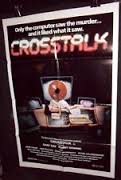
CROSS TALK
Australia, 1982, 83 minutes, Colour.
Gary Day, Penny Downie, John Ewart, Peter Collingwood, Kim Deacon, Jill Forster.
Directed by Mark Egerton.
Crosstalk is one of several Australian thrillers made in 1981-82, following tax concessions. Several of the films were condemned by critics as 'quickies'. This 80-minute film has many of the elements of a quickie, especially in the script. However, in terms of production, it is a very handsome film: Panavision colour photography, Sydney locations, excellent interior decors with a focus on computers. Initial director was Keith Salvat who was replaced by assistant director Mark Egerton. Egerton also contributed to the screenplay.
While the film is handsome, it is an imitation and tribute to, Alfred Hitchcock's Rear Window. In fact, the screenplay follows the original very closely at times. Needless to say, the tribute/imitation pales in comparison with the original. However, the idea is very interesting: the injured hero does his surveillance by computer rather than by binoculars. There is a background of multinational business deals and cover-ups rather than an individual murder. Gary Day is a rather dour hero. Kim Deacon is a young nurse but a bit in the vein of Thelma Ritter. Penny Downey is an attractive Grace Kelly equivalent. John Ewart is a contrived sinister villain. While there are many excellent aspects to Crosstalk, the film remains slight - but on its contrived lines it is quite enjoyable.
1. The appeal of the thriller? Computer thrillers of the 80s? Audience interest in computers? Surveillance? Privacy? Multinationals? Individuals against groups? The contrived screenplay - and audience acceptance of this?
2. The film as an Australian thriller: Sydney and Blue Mountains locations, the atmosphere of the city? City characters? Audience identification with characters and interests?
3. Panavision photography, colour, sets, computers, machines? The audio visuals? Surveillance? The importance of editing, close-ups, tracking styles, suspense and shocks? The electronic score and its atmosphere?
4. The background of computers and their use, human construction, invention, solving of problems, control? The computer and its registering information without thinking? The combination of technology with human thought? The value of computers? Space, size, expense? Power? The fascination with the technical? Cindy's reference to the computer as a beast? The sexual innuendo of Ed's being married to the computer?
5. The computer as character? The focus of attention during the credits? The opening? Its being moved into its own apartment? Its manner of surveillance and recording? Images, sounds? Its red light coming on? Taking on a life of its own? Making judgments on characters - so it seems? Ed and his obsession? Cindy and her dislike, final fascination and revelation? Jane and surveillance? Lights, movement, characters? The computer killing?
6. Ed as hero? Dedication and preoccupation, his work in invention, relationship with Cindy? Their retreat home, their arguing, via monitors and screens? The clashes and the accident? His recovery? The pressure from the bosses? The preoccupation with improving the computer? Therapy? Jane and the accident in the baths? Her going to look at the Stolliers’ apartment? Her death? Cindy and her support, antagonism? Whitehead and his pressures? Hollister and his visits, sinister attitudes? His preoccupation with the murder hypothesis? Checking out the computer's information? Theories, solutions? Bugging the phone, sending Jane into the apartment? The revelation of the phone calls? Growing dangers? Stollier and Whitehead and the final killing? A dour hero? Strong hero?
7. Cindy as heroine - concern, rival to the computer, clashes, help, sceptical about the murder, the confrontation at the end?
8. Jane and her work, bright and breezy, the human touch, the accident in the swimming pool, going up and hiding in Stollier's apartment, the lift and her death?
9. George and his age, rivalry, Whitehead's pawn, temptation and evil, pressures on Ed, his attempt to kill him, the phone call, his own death, as a hobo in the gardens?
10. Whitehead and his suave villainy, pressures, control, attempt to murder, confrontation with Stollier, taking the gun? The credibility of his killing Stollier?
11. Stollier and his sinister manner, smoking, his wife and the clashes, the outing and the lift, the killing of her with the loud music? The prostitute and his sexual deviance? The cover-up? The killing of George? The prostitute dressed as his wife? Ed's surveillance and his missing Stollier's return? The search of the apartment? His wife's head in the machine? The killing of Jane? The phone calls? The attack on Ed and his own death?
12. Atmosphere of suspense, the mood of suspense, clues? The opening and the focus on the computer giving clues and malfunctioning? The phones and the bugging? The special effect with the wife's head in the machine, her eye looking out of the bag in the lift?
13. The focus on machines and humanity? The importance of thriller conventions?
14. The direct parallels with Hitch cock's Rear Window? The film as imitation of, development of, tribute to?
Published in Movie Reviews
Published in
Movie Reviews
Tagged under